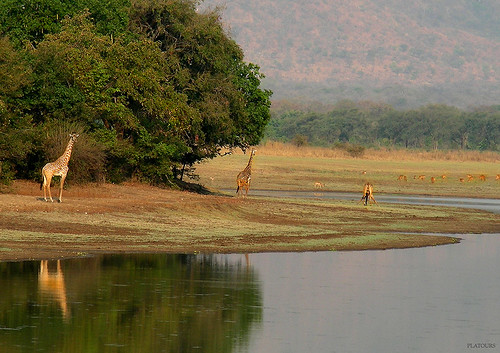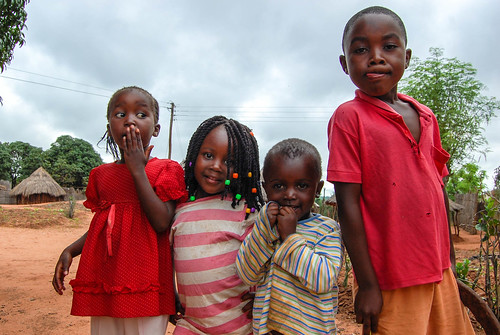Difference between revisions of "Adopting from Zambia"
(→Who Can Adopt) |
(→Who Can Be Adopted) |
||
| Line 68: | Line 68: | ||
=Who Can Be Adopted= | =Who Can Be Adopted= | ||
| + | In addition to U.S. immigration requirements, Zambia has specific requirements that a child must meet in order to be eligible for adoption: | ||
| + | |||
| + | |||
| + | '''[[Relinquishment]]:''' The relinquishing Zambian parent(s) must file a [[Consent to Adopt]] form in court. In cases where Zambian authorities have deemed that there is no competent [[Legal Guardian|legal guardian]] of the child, an [[Affidavit]] to Dispense with [[Consent to Adopt]] form is filed. | ||
| + | |||
| + | '''[[Abandonment]]:''' None. | ||
| + | |||
| + | '''Age of Adoptive Child:''' Zambian children eligible for intercountry adoption must be under 21 years of age, unmarried, and declared a child in need of care by the Department of Social Welfare. Please note that in order for a child to meet the definition of orphan under U.S. immigration law, a Form [[I-600]] petition must be filed while the child is under the age of 16 (or under the age of 18 if [[adopted]], or to be [[adopted]], together with a sibling under the age of 16). | ||
| + | |||
| + | '''Sibling Adoptions:''' None. | ||
| + | |||
| + | '''[[Special Needs]] or Medical Conditions:''' None. | ||
| + | |||
| + | '''Waiting Period or Foster Care:''' The prospective [[Adoptive Parents|adoptive parents]] (and their lawyer, if applicable) must file a petition for temporary legal guardianship with the local magistrate and bear the responsibility of preparing all court-related documentation. Once approved, the mandatory fostering phase begins. Parents must foster the child in Zambia for a minimum of three months, though the court or the Department of Social Welfare may require a longer fostering period. | ||
| + | |||
| + | |||
| + | '''Caution:''' Prospective [[Adoptive Parents|adoptive parents]] should be aware that not all children in orphanages or children’s homes are adoptable. In many countries, birth parents place their child(ren) temporarily in an orphanage or children’s home due to financial or other hardship, intending that the child return home when this becomes possible. In such cases, the birth parent(s) have rarely relinquished their [[Parental Rights|parental rights]] or consented to their child(ren)’s adoption. | ||
| + | |||
| + | |||
| + | '''NOTE:''' Prospective [[Adoptive Parents|adoptive parents]] considering adoption of a Zambian family member are advised to carefully consider whether that child will meet the definition of orphan under U.S. law, which differs significantly from the criteria for adoption under Zambian law. Zambian authorities may issue an [[Adoption Decree|adoption decree]] based on customary practice of adopting a family member to afford that child better educational opportunities, for instance. Before a consular officer can issue an immigrant visa to an [[adopted]] child, however, you must demonstrate that the child’s sole surviving parent is incapable of providing proper care for the child as measured according to local, Zambian, conditions. This fact could result in a situation where your [[adopted]] child is unable to immigrate to reside with you in the United States. | ||
=How to Adopt= | =How to Adopt= | ||
Revision as of 02:31, 12 April 2014
Contents
Hague Convention Information
Zambia is not party to the Hague Convention on Protection of Children and Co-operation in Respect of Intercountry Adoption (the Hague Adoption Convention). Intercountry adoptions of children from non-Hague countries are processed in accordance with 8 Code of Federal Regulations, Section 204.3 as it relates to orphans as defined under the Immigration and Nationality Act, Section 101(b)(1)(F). Prospective adoptive parents, including those considering adoption of a Zambian family member, are advised to carefully consider whether that child will meet the definition of orphan under U.S. immigration law.
Zambia is in the process of reviewing its child welfare-related laws, including those pertaining to adoption. This review is a lengthy process, and prospective adoptive parents should be aware that adoption procedures may be amended at any time.
U.S. citizens living outside Zambia may find it particularly challenging to adopt a Zambian child. Currently, there are no registered U.S. adoption agencies authorized to work in Zambia. Prospective adoptive parents may wish to hire a local attorney to assist with local adoption procedures. Please note that the U.S. Embassy in Lusaka, Zambia cannot represent prospective adoptive parents before the Zambian government or courts or act as a liaison for parents during the adoption process.
Zambian courts do not issue custody/guardianship orders for the purpose of finalizing adoptions abroad. Both prospective adoptive parents, if married, must physically appear before the court in order to adopt a child, though the court may subsequently permit one parent to return home while the other stays behind to conclude the process.
U.S. IMMIGRATION REQUIREMENTS FOR INTERCOUNTRY ADOPTIONS
To bring an adopted child to the United States from Zambia, you must meet eligibility and suitability requirements . The U.S. Department of Homeland Security, U.S. Citizenship and Immigration Services (USCIS) determines Who Can Adopt under U.S. immigration law.
Additionally, a child must meet the definition of orphan under U.S. law in order to be eligible to immigrate to the United States on an IR-3 or IR-4 immigrant visa.
Who Can Adopt
In addition to these U.S. requirements, you must also be found eligible to adopt by Zambia. Zambia requires that prospective adoptive parents meet the following:
Residency
Based on the Zambian Adoption Act, prospective adoptive parents must foster a child in Zambia for three months (the fostering phase). The fostering period for a “foreign” (non-Zambian) child is 12 months. This requirement is only reduced at a magistrate’s discretion upon presentation of a “certificate of urgency.”
Age of Adopting Parents
Prospective adoptive parent(s) must be at least 25 years of age. If the prospective parents are a couple, at least one parent must be 25 years of age and at least 21 years older than the child. If prospective adoptive parents are related to the child, the age requirement is 21 years of age.
Marriage
Prospective adoptive parents may be married or single. There is no provision in the law for gay, lesbian, bisexual, or transgendered couples or individuals to adopt.
Income
Prospective adoptive parents must be able to demonstrate adequate finances. An acceptable home study, a requirement of both U.S. and Zambian law, will usually suffice.
Other
Adoption by gay, lesbian, transgendered or same-sex persons or couples is not permitted under Zambian law.
Who Can Be Adopted
In addition to U.S. immigration requirements, Zambia has specific requirements that a child must meet in order to be eligible for adoption:
Relinquishment: The relinquishing Zambian parent(s) must file a Consent to Adopt form in court. In cases where Zambian authorities have deemed that there is no competent legal guardian of the child, an Affidavit to Dispense with Consent to Adopt form is filed.
Abandonment: None.
Age of Adoptive Child: Zambian children eligible for intercountry adoption must be under 21 years of age, unmarried, and declared a child in need of care by the Department of Social Welfare. Please note that in order for a child to meet the definition of orphan under U.S. immigration law, a Form I-600 petition must be filed while the child is under the age of 16 (or under the age of 18 if adopted, or to be adopted, together with a sibling under the age of 16).
Sibling Adoptions: None.
Special Needs or Medical Conditions: None.
Waiting Period or Foster Care: The prospective adoptive parents (and their lawyer, if applicable) must file a petition for temporary legal guardianship with the local magistrate and bear the responsibility of preparing all court-related documentation. Once approved, the mandatory fostering phase begins. Parents must foster the child in Zambia for a minimum of three months, though the court or the Department of Social Welfare may require a longer fostering period.
Caution: Prospective adoptive parents should be aware that not all children in orphanages or children’s homes are adoptable. In many countries, birth parents place their child(ren) temporarily in an orphanage or children’s home due to financial or other hardship, intending that the child return home when this becomes possible. In such cases, the birth parent(s) have rarely relinquished their parental rights or consented to their child(ren)’s adoption.
NOTE: Prospective adoptive parents considering adoption of a Zambian family member are advised to carefully consider whether that child will meet the definition of orphan under U.S. law, which differs significantly from the criteria for adoption under Zambian law. Zambian authorities may issue an adoption decree based on customary practice of adopting a family member to afford that child better educational opportunities, for instance. Before a consular officer can issue an immigrant visa to an adopted child, however, you must demonstrate that the child’s sole surviving parent is incapable of providing proper care for the child as measured according to local, Zambian, conditions. This fact could result in a situation where your adopted child is unable to immigrate to reside with you in the United States.
How to Adopt
Adoption Authority
The Process
Traveling Abroad
Applying for Your U.S. Passport
A valid U.S. passport is required to enter and leave Zambia. Only the U.S. Department of State has the authority to grant, issue, or verify U.S. passports. Getting or renewing a passport is easy. The Passport Application Wizard will help you determine which passport form you need, help you to complete the form online, estimate your payment, and generate the form for you to print-all in one place.
Obtaining Your Visa
In addition to a U.S. passport, you also need to obtain a visa. A visa is an official document issued by a foreign country that formally allows you to visit. Where required, visas are attached to your passport and allow you to enter a foreign nation. To find information about obtaining a visa for Zambia, see the Department of State's Country Specific Information.
Staying Safe on Your Trip
Before you travel, it's always a good practice to investigate the local conditions, laws, political landscape, and culture of the country. The State Department is a good place to start. The Department of State provides Country Specific Information for every country of the world about various issues, including the health conditions, crime, unusual currency or entry requirements, and any areas of instability.
Staying in Touch on Your Trip
When traveling during the adoption process, we encourage you to register your trip with the Department of State. Travel registration makes it possible to contact you if necessary. Whether there's a family emergency in the United States, or a crisis in Zambia, registration assists the U.S. Embassy or Consulate in reaching you. Registration is free and can be done online.
After Adoption
What resources are available to assist families after the adoption?
Many adoptive parents find it important to find support after the adoption. Take advantage of all the resources available to your family -- whether it's another adoptive family, a support group, an advocacy organization, or your religious or community services.
Here are some good places to start your support group search:
Child Welfare Information Gateway
North American Council on Adoptable Children
Adoption Services Support Group for Adopting Persons
SOURCE
Intercountry Adoption, Bureau of Consular Affairs. U.S. Department of State Country Information









